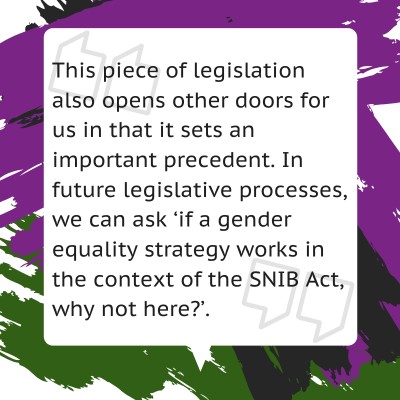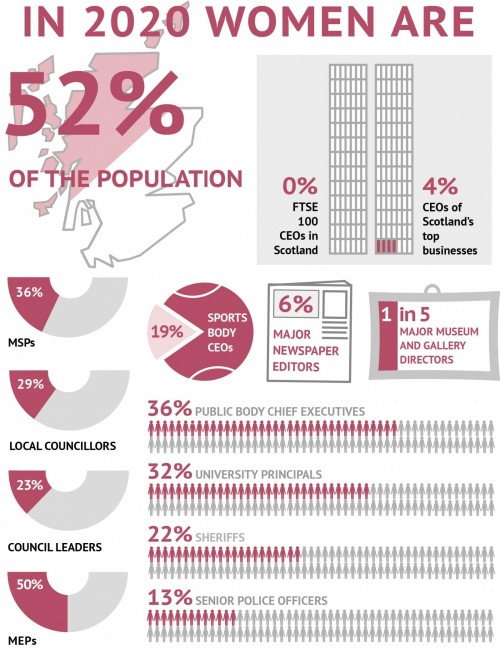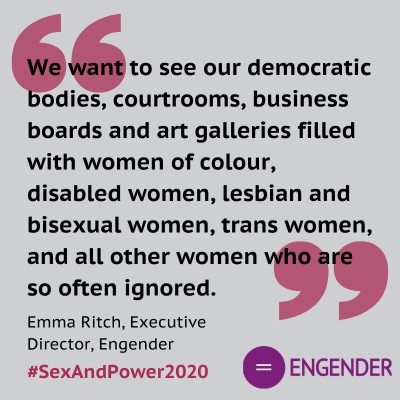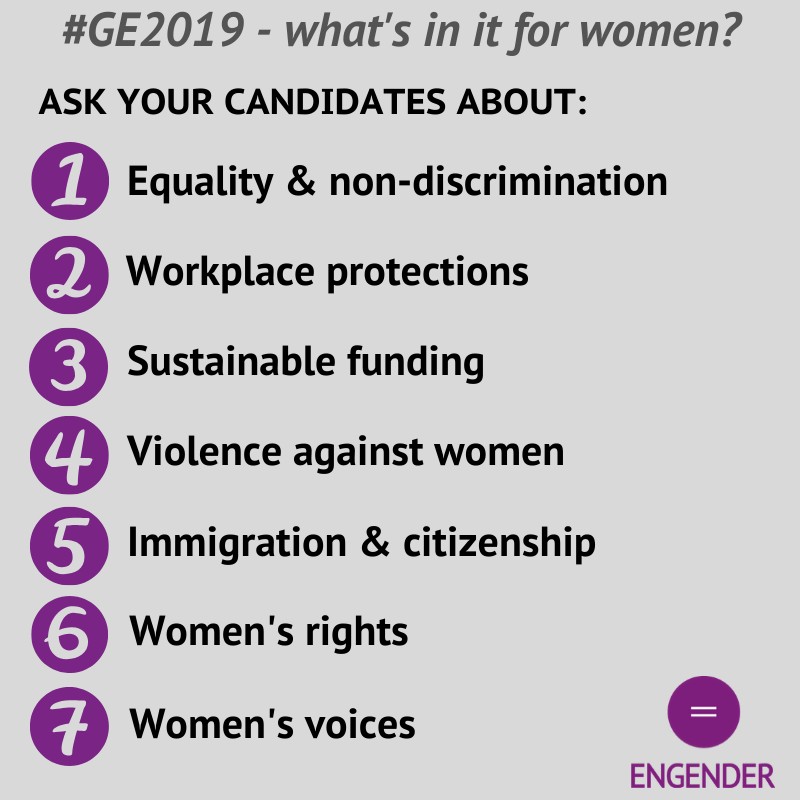Engender blog
All of Engender’s latest news. Reports, reviews, books, articles, and information from across Scotland’s women’s sector.
We would love to hear from other feminists around Scotland. Check out our guidelines for more information on how you can blog for us.
GUEST POST: New legislation puts gender equality at the heart of the Scottish National Investment Bank

Last week, the Scottish National Investment Bank Bill was passed at Holyrood, and we were delighted to see the culmination of work by ourselves and Close the Gap in securing amendments which integrate women's equality into the Bill. Today we have a guest blog from Ruth Boyle, Policy and Parliamentary Manager at Close the Gap, celebrating success in gendering the Bill and exploring the process of building gender equality into a piece of legislation.
Facilitating changes in policy can be a slow process, and it’s often very difficult to measure your impact and success. So, when your advocacy has a clear and tangible impact, we don’t think it should pass without note!
Over the past few months, Close the Gap has been working closely with Engender to promote the importance of building gender equality into the design of the Scottish National Investment Bank (SNIB).
Traditionally, economic development agencies have not incorporated women’s specific needs and have not prioritised women’s equality. Consequently, the gender pay gap remains at 13%, and if numbers of women-led businesses in Scotland increased to equal those of men, it would lead to a 5% increase in GDP, equivalent to £7.6bn. We thought the SNIB Bill was a chance to do things differently.
Sex and Power 2020

Today Engender has released Sex and Power 2020, a report showing the extent of men's overrepresentation in positions of power in Scotland. The report follows Sex and Power 2017, and shows that there has been an increase of women's representation of just 4%.
Women make up 52% of the Scottish population and should be equally represented across the spectrum of civic life. Yet, gender parity in public spheres is far from becoming reality. Of the 39 different spheres we researched, only 5 had achieved 50% women, and only 1 of these (the Scottish Government Strategic Board) exceeded it, with 11 women and 9 men.
Since ‘Sex and Power 2017’ was released, there has been progress in several spheres, including:
Government and Politics
- European Parliament
- Scottish Parliament, Scottish Parliament Strategic Board and Scottish Parliament Corporate Body
- Local Council Leaders and Committee Conveners
Public Sector
- Local Authority Chief Executives
- Health Service Board Chairs
- Senior Police Officers
Media and Culture
- Heads of National Broadcasters
- Heads of Production Companies
Caution must be taken with these figures though – despite showing increased women’s representation, in most of these spheres, men still remain the dominant force. Certain sectors have shown little or no progress towards increasing their gender balance since 2017.
The following spheres still have under 20% women:
- Heads of transport bodies
- Temporary Judges at the Supreme Court
- Trade Union Scottish Secretaries
- Chief executives of national sports bodies
In addition:
- There are 0 women as CEOs of Scottish-based FTSE 100 and 250 companies
- Only 2 women out of 50 head up top Scottish companies
- Scotland has only 1 woman as editor of a major national newspaper, 1 woman as political editor in a major newspaper, and 1 woman as head of a national broadcaster.
These figures show us that not enough change is happening, and not quickly enough, to redress the gender imbalance in Scotland’s corridors of power. In most cases, the numbers of women have increased only very slightly, usually representing the difference of one or two changes in personnel, rather than a stepchange in employment practices, organisational culture, or commitment to diversity.

Emma Ritch, Engender's Executive Director spoke to the Herald newspaper about the figures, saying:
But there is cause to be hopeful. In politics where consistent pressure has been applied from groups like Women 5050, the Coalition for Racial Equality and Rights, and the Equality Network, we have seen a change. Scotland has equal representation in our MEPs, in our Cabinet, and in local authority chief executives. This demonstrates that persistence in calling for change, along with feminist leadership, can see improvements in women’s representation.
Much more needs to be done to ensure we see 50% of positions of power in Scotland held by women, and that these women represent the true diversity of Scotland. We want to see our democratic bodies, courtrooms, business boards and art galleries filled with women of colour, disabled women, lesbian and bisexual women, trans women, and all other women who are so often ignored.”
Read Sex and Power 2020 here.
GUEST POST: Four days? For whom?
In this guest blog, Ellie Hutchinson highlights the unseen work done by women in Scotland, and what this means for the calls to more flexible working practices. You can follow Ellie over on Twitter for feminist chat, to find out about her work with the Empower Project and Canongate Youth, and the occasional CBeebies review.
4 day working weeks, flexible working practices and increased childcare is all the [work] rage. With increasing research into the benefits of a 4 day working week, tech-bros disrupting work all over the shop, and manifestos exploring ways to rework work, we might finally be moving to a place where we understand that paid employment is not the be all and end all of our lives. Welcome to the revolution sisters!
But to quote the great Destiny’s Child: "Question."
Who, what, how?
GUEST POST: WHT the ****
During this 16 Days of Activism On Violence Against Women - and with high profile #metoo stories appearing in the courts and the media - we continue to hear stories of harassment and abuse of women and girls. This guest post, from an author who wishes to remain anonymous, explores the issues of power, privilege, and 'wandering hand trouble'.
-400.png) Back when I was a young woman, when it
was described as ‘wandering hand trouble’ (WHT) for short, we were
taught that sexual assault and harassment were just what happened.
Back when I was a young woman, when it
was described as ‘wandering hand trouble’ (WHT) for short, we were
taught that sexual assault and harassment were just what happened.
It would happen more if you were to pluck your eyebrows, wear a choker, or hoik your skirt up above your knees. If you wore American Tan 60 denier tights, you was ‘asking for it’. We didn’t really know what we were supposed to be asking for, especially when we wore knee-length cotton socks on top of the tights.
It was just another of the great mysteries when my mother would say, ‘don’t let your father see you wearing that,’ and which made me feel funny inside because I didn’t know why not.
#GE2019 - what's in it for women?
The snap General Election has seen record numbers of people registering to vote, parties scrambling to select candidate and release manifestos, and wall-to-wall coverage of different Brexit proposals.
As we approach the UK General Election on the 12th of December 2019, Engender is concerned that significant uncertainties with respect to women’s futures remain. Despite the fact that this election has been nicknamed “the Brexit election” we have not heard any proposals or commitments from any party which centre women within their vision for the future. This is highly concerning given that EU-membership has been instrumental in progressing women’s equality in the UK, driving the expansion of gender mainstreaming into UK and Scottish policy, and ensuring minimum legal protections for women’s rights and equality, particularly in the workplace.
So we have identified seven key areas which are vital for women's equality, and which should feature in this election:

Downloads
 Engender Briefing: Pension Credit Entitlement Changes
From 15 May 2019, new changes will be introduced which will require couples where one partner has reached state pension age and one has not (‘mixed age couples’) to claim universal credit (UC) instead of Pension Credit.
Engender Briefing: Pension Credit Entitlement Changes
From 15 May 2019, new changes will be introduced which will require couples where one partner has reached state pension age and one has not (‘mixed age couples’) to claim universal credit (UC) instead of Pension Credit.
 Engender Parliamentary Briefing: Condemnation of Misogyny, Racism, Harassment and Sexism
Engender welcomes this Scottish Parliament Debate on Condemnation of Misogyny, Racism, Harassment and Sexism and the opportunity to raise awareness of the ways in which women in Scotland’s inequality contributes to gender-based violence.
Engender Parliamentary Briefing: Condemnation of Misogyny, Racism, Harassment and Sexism
Engender welcomes this Scottish Parliament Debate on Condemnation of Misogyny, Racism, Harassment and Sexism and the opportunity to raise awareness of the ways in which women in Scotland’s inequality contributes to gender-based violence.
 Gender Matters in Social Security: Individual Payments of Universal Credit
A paper calling on the Scottish Government to automatically split payments of Universal Credit between couples, once this power is devolved to the Scottish Parliament.
Gender Matters in Social Security: Individual Payments of Universal Credit
A paper calling on the Scottish Government to automatically split payments of Universal Credit between couples, once this power is devolved to the Scottish Parliament.
 Gender Matters Manifesto: Twenty for 2016
This manifesto sets out measures that, with political will, can be taken over the next parliamentary term in pursuit of these goals.
Gender Matters Manifesto: Twenty for 2016
This manifesto sets out measures that, with political will, can be taken over the next parliamentary term in pursuit of these goals.
 Scottish NGO Briefing for UN Special Rapporteur on Violence Against Women
Joint briefing paper for the UN Rapporteur on Violence Against Women.
Scottish NGO Briefing for UN Special Rapporteur on Violence Against Women
Joint briefing paper for the UN Rapporteur on Violence Against Women.

Newsletter
Sign up to receive our newsletter here:
Sign up to our mailing list
Receive key feminist updates direct to your inbox: